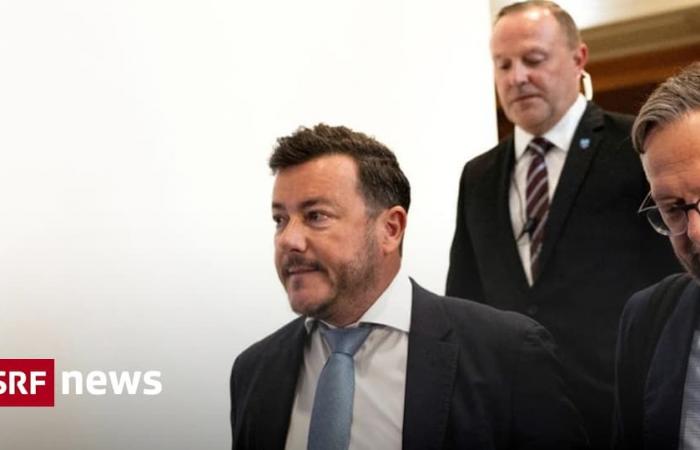The ex-real estate entrepreneur is in custody. About the suspicion, the investigations, assessments – and Switzerland.
René Benko’s background: The Austrian former real estate entrepreneur went bankrupt in November 2023 with Signa Holding, the convoluted and confusing umbrella company of his real estate empire. He had to file for bankruptcy. According to the Austrian insolvency administrator, Benko’s creditors (lenders) are demanding a total of around 2.4 billion euros back from him.
What happened? Benko was arrested in his villa in Innsbruck this morning, writes the “Kronen Zeitung”. There were also several house searches in Benko’s offices, in a luxury chalet and at his residence in Vienna. This is because the economic and corruption public prosecutor’s office in Vienna, which has been investigating at full speed in recent weeks, was apparently able to collect new evidence. The public prosecutor’s office accuses Benko of concealing the fact that he still has considerable financial resources privately, says ARD Austria correspondent Wolfgang Vichtl. Benko himself filed for personal bankruptcy in 2024.
Why the arrest? The public prosecutor’s office accuses the 47-year-old of having hidden private assets in order to withhold the money owed to them from Signa’s insolvency. According to Vichtl, he forged at least one invoice. Benko is presumed innocent.
Correspondent: “The public prosecutor’s office was under enormous pressure”
Open the box
Box zuklappen
ARD correspondent Vichtl says about Benko’s arrest: “The public prosecutor’s office was under enormous pressure and now had to show how serious it was, after Benko has recently made headlines mainly because of how he lives: publicly, on a large scale, like a billionaire, as if nothing had happened.”
SRF foreign editor Peter Vogeli also says that Benko has been at large until now and has been met with a lack of understanding for a long time; all the more so since, according to media reports, he lived a luxurious life and is said to live in a villa whose rent amounts to 240,000 euros per month and is paid by his mother.
How did the investigators proceed? Prosecutors monitored Benko’s phone calls and emails. She also interviewed his former business partners and employees. Apparently a lot had accumulated there, said correspondent Vichtl.
What is it mainly about? At the center is the Laura Private Foundation, named after Benko’s daughter. There is a lot of wealth in this foundation. Schlosshotel Igls Betriebs GmbH & Co KG is one of them. This is the company that owns the villa in which Benko lives with his family – and whose rental costs are covered by Benko’s mother, as the Austrian newspaper “Standard” reported in November. The mother, in turn, is one of the beneficiaries of the Laura Foundation. Many people from Benko’s private environment have access to a lot of money, but Benko doesn’t have access to it formally, says ARD correspondent Vichtl. The public prosecutor’s office doubts this and accuses Benko of being the de facto ruler and the beneficial owner of this Laura Foundation.
Who is René Benko?
Open the box
Box zuklappen
Benko, who was born in Innsbruck in 1977, began renovating attics as a teenager. He left business school without a degree and went into the real estate business. That was the start of a spectacular rise to becoming a multiple billionaire, who was also often courted by politicians.
The Austrian entrepreneur had built up a large portfolio with his Signa Group, which also included the German department store groups KaDeWe and Galeria. Benko was first listed as one of the richest people in the world by US magazine Forbes in 2019 in The World’s Billionaires compilation; At the time, his fortune was estimated at $5 billion. He was considered one of the richest Austrians.
As interest rates, energy prices and construction costs rose, the nested company structure collapsed.
To what extent is Switzerland affected by Benko’s machinations? In Switzerland, Benko is best known as the former co-owner of the Globus department store chain. This was transferred to its Thai partner Central Group last autumn. The Globus properties were not part of the transaction. For the time being, half of these remain owned by Central Group and half by the insolvent Signa. The future of the properties is still open. According to media reports, the Thais could completely take over the Globus building in Zurich. The other properties, for example in Basel or Bern, could be sold to third parties. In addition, several Swiss banks had granted loans to the insolvent Signa Group.
Julius Baer and cantonal banks: the Swiss Signa creditors
Open the box
Box zuklappen
Swiss banks have granted the struggling real estate mogul Benko millions in loans, including…
- Julius Baer: At the beginning of 2024, the bank had to completely write off loans to the insolvent Signa Group amounting to 606 million francs. The then CEO subsequently resigned. 250 jobs were also cut – as part of an ongoing savings program, the bank announced.
- Graubünden Cantonal Bank (GKB): GKB granted Pleitier Benko’s Signa Group a loan of 60 million francs. An investigation has already been launched. Politics also got involved.
- Zurich Cantonal Bank: The ZKB granted the Signa Group a loan for a “very low double-digit million amount,” said the bank’s chief financial officer, Martin Bardenhewer, to the “Tagesanzeiger” at the beginning of the year. According to a list of creditors published by the Austrian news portal oe24.at, the ZKB loan is said to be around 11 million euros.
- Valais Cantonal Bank: The bank confirmed that it was a creditor of Benko’s network of companies. It’s almost 25 million francs – as much as noted on the published list of creditors.
- Migros Bank: The MGB announced that it had granted a loan of 125 million francs when Globus was sold in 2020 to a joint venture between Signa and the Thai Central Group. It is “partially secured by guarantees”.
- Obwalden Cantonal Bankwith 25 million francs.
- In addition, according to the list of creditors Zurich Insurance bequeathed a 1.8 million euro loan to Signa.
What’s next? Benko was interrogated after his arrest. The public prosecutor has now requested remand and transfer to prison. Now a judge has to make a decision within two days. The decision is also likely to be about the risk of absconding.
Swiss






